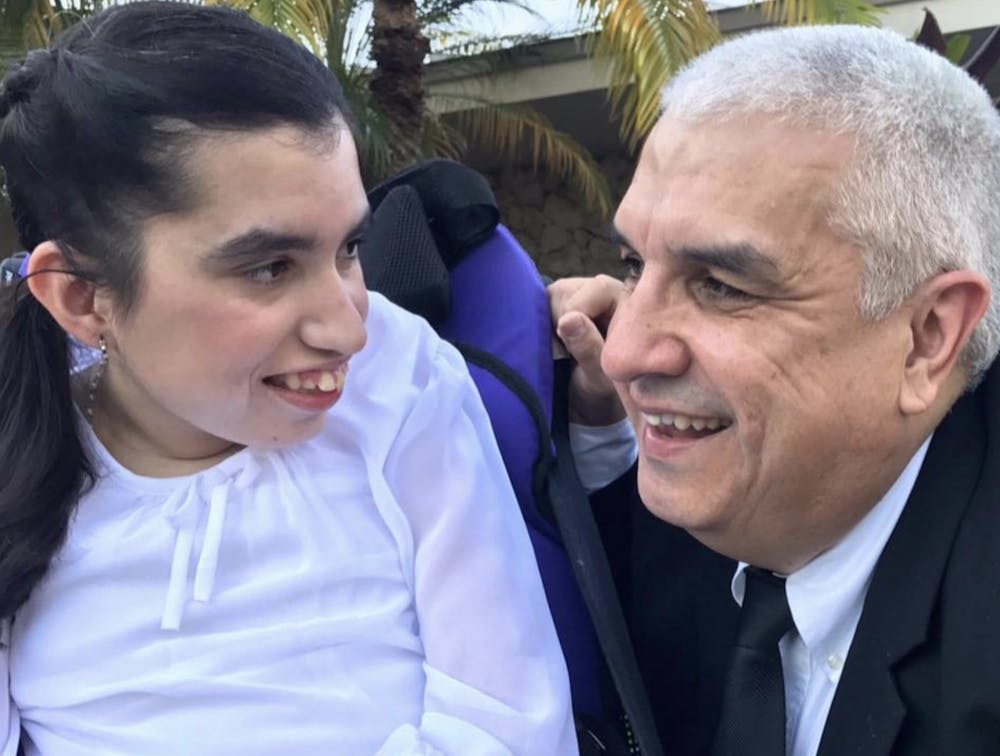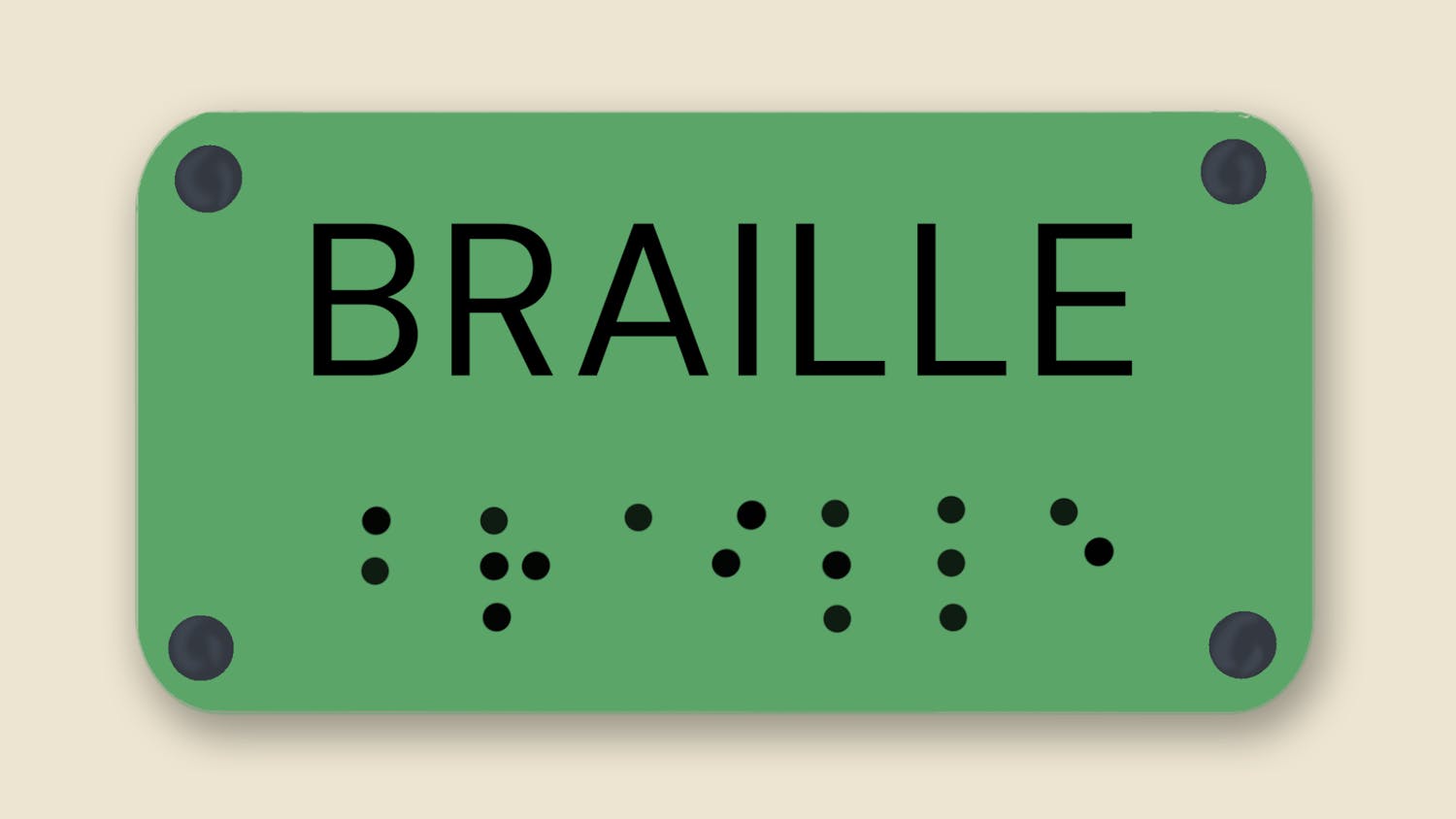In the comfort of her Miami home, 34-year-old Julianne Espinosa lies in bed captivated by videos of Disney princesses flashing across her television screen. As echoes of “The Little Mermaid” fill her room, she smiles brightly, silently expressing the words she cannot say.
Diagnosed at 2 years old with Rett syndrome, a rare neurological and developmental disorder, Julianne Espinosa has lost the ability to talk, eat or walk without assistance. As her condition has progressed, her parents have dedicated themselves to her care while working to raise awareness and funds for the often unknown disorder.
As of 2023, out of more than 130 teams and individuals, the UF alumni family has raised the highest amount of money for the International Rett Syndrome Foundation and continues to look for new ways to provide support and resources for the disorder.
Before Julianne Espinosa was diagnosed with Rett syndrome, Angel Espinosa, a 63-year-old UF alumnus, and Ileana Espinosa, a 62-year-old UF alumna, married while Angel Espinosa was completing his UF master’s degree in 1985. Upon Julianne Espinosa's birth, they watched as she flourished into what they believed to be a healthy child.
“We thought we had a normal baby for almost two years,” Julianne’s father said. “She would walk all over the place and play with toys, and I would just follow her. She would love to look at books and just turn the pages.”
Just before Julianne Espinosa turned 2, her parents began to notice unusual changes in her behavior.
As Julianne Espinosa’s primary caretaker at the time, Ileana Espinosa watched as her daughter fell behind other children her age, often silently staring at the ceiling or whispering words she once shouted.
“As she got a little bit older, she wasn't interacting with the other kids," Angel Espinosa said. “She tended to just hang out … She wouldn’t look you in the eye. She wasn’t being social with other kids on the playground.”
Unable to ignore her family’s concerns, Ileana Espinosa took her daughter to an appointment with the head of the pediatric neurology department at Miami Children’s Hospital.
During the appointment, the doctor looked at Julianne Espinosa and handed Ileana a pamphlet about Rett syndrome from a conference he had recently attended. The pamphlet’s cover depicted an image of a young girl in a wheelchair, Ileana Espinosa said.
“It was awful,” she said. “I couldn't speak. It was just tears that were coming down my eyes. There was no voice, and we just left with the paper and my baby.”
Struggling with the denial of the news, Angel Espinosa was initially convinced his daughter was on the Autism spectrum, partly because many of the early stages of Rett syndrome mimic autism, he said.
After trying a variety of autism therapies for several months and exhibiting no improvement, 2-year-old Julianne Espinosa was officially diagnosed with Rett syndrome during a weeklong clinical observation trial at Kennedy Krieger Institute, a Johns Hopkins Hospital affiliate in Baltimore, Maryland.
Caused by a mutation in the X chromosome, Julianne Espinosa’s condition is a non-inherited genetic disorder that affects one in 10,000 girls and “even more rarely boys,” according to the International Rett Syndrome Foundation. The disorder doesn’t typically present symptoms until six to 18 months after birth, when a child’s behavior begins to “regress,” making it difficult to diagnose or understand, her father said.
The symptoms can also vary in severity, yet most patients suffer from lifelong impairments like cardiac issues, difficulty walking or moving, loss of speech, scoliosis and a decline in motor skills, he said.
“Imagine the symptoms of autism, cerebral palsy, epilepsy, eating disorders, breathing issues and anxiety all in one person who cannot talk,” Angel Espinosa said.
Now that Julianne Espinosa struggles with seizures, scoliosis and difficulty walking, she is restricted to her bed, the couch or a stroller for most of her day. She also uses a gastrostomy tube for food and medication due to her difficulty swallowing, and she sleeps with a ventilator mask at night.
Since 2013, Julianne Espinosa has undergone three heart procedures to implant a pacemaker and cardioverter-defibrillator. Her father has watched her suffer from cardiac arrest over 50 times, he said.
One of the scariest moments Angel Espinosa recalled was during his daughter's first time in the hospital for pneumonia in 2013, when he peeked through a crack in the ICU curtain to watch her experience a cardiac arrest and receive CPR for more than 20 minutes.
“I looked inside, and I saw this little woman on her knees on top of the bed giving Julianne CPR and pumping her chest,” he said. “It was the scariest night of my life. My whole life was flashing before me. I thought we were going to lose her right there.”
Following Julianne’s unexpected hospitalizations, she hasn’t experienced a cardiac arrest since 2015. She now lives comfortably in her parents’ Miami home, where she loves to watch Disney movies, swim in the pool and listen to musicals.
Each morning, Angel wakes up to give Julianne her medications, and he continues to do so five more times until she goes to bed. He also takes Julianne for walks, helps her use the bathroom, aids in her physical therapy, carries her from place to place and sits with her while she watches television.
Although the long hours of caretaking can be challenging, Angel said there is nothing he would rather do more.
“You have to sacrifice a lot, and you give up a lot,” he said. “But every day, when I wake up and go into her room and wake her up, I see that smile she gives me, and it gives you a good feeling for the rest of the day … You can't beat that feeling. It's just a joy, she's an angel.”
Julianne Espinosa’s persistent smile and eyes have become her primary form of communication. When she likes a Disney movie or is happy to see a visitor, she uses her smile and eyes to say so.
“The way she looks at me and now how she looks at her father, it’s just pure love that she is showering me with,” Ileana said.
Due to Julianne’s limited form of communication, Angel Espinosa has taken on the task of becoming her advocate and voice.
“I am her voice, she is my heart,” he often says.
As her voice, Angel Espinosa said he aims to spread awareness for the disorder and provide support for groundbreaking research.
For over 14 years, Angel and Ileana Espinosa have worked with the International Rett Syndrome Foundation to raise money for research on possible cures and medications for the disorder.
The family’s primary involvement with the foundation is through its yearly Strollathon events, which are held annually in Florida and 11 other states.
During the Strollathon events, Julianne Espinosa, her friends and her family walk together to raise awareness and reach a set fundraising goal. As of 2023, the family has raised a total of $83,910, making them the highest-grossing group in the country, contributing to $162,000 raised by Strollathon groups in the state, according to the International Rett Syndrome Foundation.
In addition to the Strollathon events, Julianne Espinosa’s parents work to raise money for the foundation through donations from the Florida community. Angel Espinosa said people can donate through a link on his social media pages or the variety of QR codes placed throughout his family-owned laundry and cleaners business in Coconut Grove, Miami.
The funds the Espinosa family raises go to supporting families with Rett syndrome and aiding in a broad range of research to find a cure or medications for the disorder.
One of the most recent steps the funding has supported is research for the medication Trofinetide, also known as DAYBUE, which was approved by the Food and Drug Administration in March.
DAYBUE is the first and only treatment approved by the FDA for Rett syndrome, and the medication helps in “improving the signs and symptoms” of the disorder, according to Acadia Pharmaceuticals.
From what he’s heard, the early results have been promising, Angel Espinosa said.
“I’ve been told that with a lot of patients around the country, half of them have been able to reduce the amount of seizure medications they take, and some have actually been able to eliminate them completely,” he said.
Since starting the medication in late July, Julianne Espinosa is one of the earliest patients to be prescribed the medication. Angel said he is patiently watching for improvements in her health.
Hopeful that the medication is one step toward a cure, Angel Espinosa said he believes it may indicate promising new medications and gene therapy trials for other neurological diseases like Parkinson’s and Alzheimer’s.
Angel Espinosa also believes that if future research leads to a cure families can notice the early signs of the disorder and prevent it.
“I truly believe that if Julianne had gotten something like that early, she would have lived a normal life,” he said. “I hope that families won't have to go through what we went through. Their child will be able to go to school, have friends, get married and have their own kids.”
Although Julianne Espinosa will never be able to do the same things other adults do so freely, Ileana Espinosa said she is grateful knowing her daughter is happy and loved.
“As long as she's here with me, I'm happy,” she said.
Contact Alexandra Burns at aburns@alligator.org. Follow her on Twitter @alexaburnsuf.






